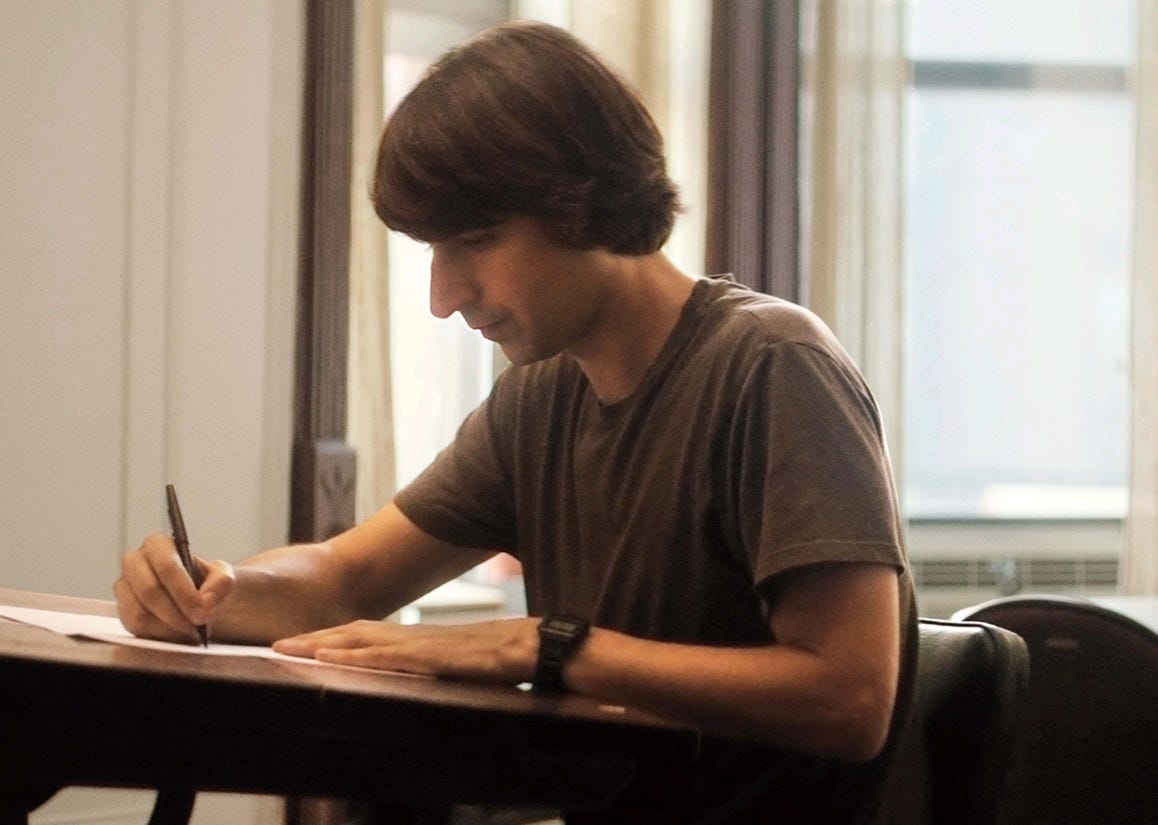How Demetri Martin turned his personal grief into deadpan comedy in 'Dean'
Martin's directorial debut is completely fictional, yet it's still an impressively personal tale for the comedian-turned-filmmaker.

In his directorial debut Dean, writer-director Demetri Martin plays the titular role of an illustrator whose unwillingness to deal with the recent death of his mother leads to him abandoning his quiet life as an illustrator in his hometown of New York City to seek new opportunities on the West Coast in an attempt to escape the realities of his upended world.
It’s a tale of love, loss, and self-examination, and it’s one that is especially personal to Martin, who somehow managed to find a way to turn his own personal grief from his beloved father’s death into respectable deadpan comedy.
When I sat down with Martin for an interview last month, we touched on how filmmaking allowed him to open up in a way that his stand-up never allowed for, while also reflecting on just how shitty it can be to not able to find your true inner self, even when you’re in your forties.
Our conversation begins below:
How personal of a film is Dean for you?
It’s really personal. It’s all fiction, but emotionally it’s all my real experience. My dad passed away when I was 20, and he was only 46, so we were all very surprised. I’m not sure if my family has ever really recovered from it in a lot of ways. That’s the thing, I guess: I’ve never really found a way to do that in stand-up. It’s never been appealing for me to go up there and say, “Hey, my dad…”
I’m personally drawn to movies that are a little bit more heartfelt or have a certain sincerity to them. I love ironic, sarcastic comedies as much as anybody, but maybe it’s getting a little bit old or something. I want to feel what the characters on the screen feel. I want to be pulled in. When it came time to make my first movie, I knew I needed to start with something that I know — at least emotionally — but also make it fiction.
So there’s nothing in the movie that actually happened to me, but there are some lines that sort of actually came from my real life. The idea is the first thing that you never really get over. That happened to me when I was 20 when my dad died. I think everybody has that at a different age and maybe if you’re older when that happens if you’re lucky. Maybe it’s losing a parent or just something else terrible like a divorce.
Do you think that’s what makes Dean’s story so relatable?
Yeah. That and the fact that it’s an honest film. That’s probably going to be its strength and vulnerability, which is to say, in the internet age, I’m just preparing to get myself pummeled by people for this thing. It’s not sarcastic, it’s not cool, it’s just sincere. I think that makes it relatable for people who have had any kind of experience losing something that really changed them.
Also, I think I just got really lucky. I got good people to be in it.
Speaking of which, how did Kevin Kline and Mary Steenburgen get involved with the project?
I didn’t know Kevin Kline beforehand, but my agents got the script to him and he liked it enough to meet with me, and then when we met we got to know each other a little bit and he agreed to be in the movie.
I really have him to thank for getting most of the other people. I even got most of my financing after Kevin agreed to do the movie. He really did me a favor and kind of made the movie happen.
He and Mary knew each other, and she was like, “Oh, Kevin! I love him,” and then she agreed to be in the movie, too. Gillian [Jacobs] knew my comedy a little bit so she was up for it, and then Kevin was just like this calling card where he gave it legitimacy. It just filtered down from there.
Would you say your awkwardness and anxiety plays a key role in your comedy?
I’m definitely not the most graceful person. It’s funny, I’ve been talking about this a lot on stage lately because I’m now in my forties and in some ways, I thought I’d have it all figured out by now. I thought I would be like, “Cool, this is who I am now. I’m comfortable in my own skin.”
But I’m just not, you know? It sucks.
Did making this film help you accept that fact at all?
I’m kind of just accepting it now but in the movie, it was certainly very useful to just be like, “Cool, I’m often more awkward then I want to be,” and it just pisses me off. If you’re not a smooth person, to try and make a movie about a guy who is smooth, I would probably just die a terrible death.
Luckily, I’m just trying to make comedies because when I look at some of the handsome movie star type guys who are like action heroes and stuff, who doesn’t want to be that at some point? You get the girl, you’re in control, you do your own stunts.
I’m just like, “I was on the math team. That shit’s not happening for me.”



